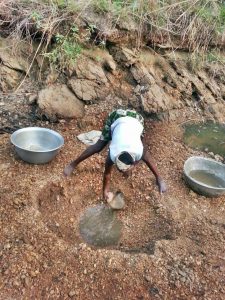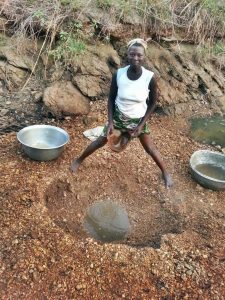This project is made possible through the partnership of WATER CHARITY and the NATIONAL PEACE CORPS ASSOCIATION. ![]()
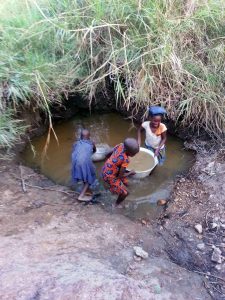 Location
Location
Tchore Center, Canton of Tchore, Kara Region, Togo
Community Description
This community received its political autonomy in 2012. The village is the seat of the regional chief, and all disputes or social affairs take place in his courtyard. There is a small clinic that provides first-aid, medicine and midwife services. This clinic services the seven surrounding villages that make up the political limits.
The market in the center of town goes from morning to night every Tuesday, with plenty of local beer and fried doughnuts. Next to the market is the elementary school, with a kindergarten. The pace of life is very slow, but not boring.
Problem Addressed
The most fundamental problem of the community is the scarcity of water. The rains stop in mid-November and do not begin again until May. During this seven- month interval, the river dries up and so do the three wells. The only water to be found comes from holes in the ground, which is hardly enough to sustain life.
The mid-wife at the hospital uses dirty groundwater to wash newborn babies and to clean the vaginal tracts of new mothers. The use of dirty water leads to elevated rates of dermatologic and infectious diseases.
Women and girls are exhausted by the competition for resources because they have to wake up early and go far to fetch water. Many women spend their whole day trying to accumulate enough water for their families.
A main source of income for women is the preparation of local sorghum beer, but women use dirty water and the community often suffers from intestinal worms and parasites.
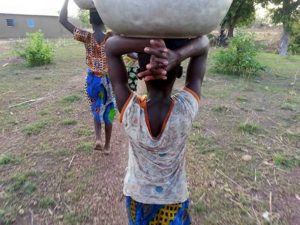
Project Description
This project is to build a borehole with a hand pump in proximity to the community hospital and elementary school.
The well will be dug to about 40-60 meters and be enclosed by a cement wall. After the technical work, the community will plant trees around the pump in the hopes of retaining water and beautifying the environment around the well.
An open community meeting will be held to choose a water committee to oversee the management of the well. This committee will decide the method of payment for water, and how to collect this money. There will be members designated as daily maintenance agents and several women will be trained by the pump technicians on preventative maintenance and small repairs.
Water Charity funds will go to renting heavy machinery, drilling the well, purchasing the materials (such as pipes, pump hardware, cement), and paying for skilled labor.
The community will add approximately $2,000 to the project’s total funds, along with sand, gravel, manual labor and lodging of the skilled laborers.
The company contracted to perform the work is E-Forage Togo, a local business based in Kara.
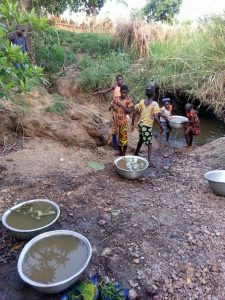 Project Impact
Project Impact
500 people will benefit from the project.
Let Girls Learn
This project will allow girls to stay in school because it brings water closer to them, reducing the amount of time it takes for them to retrieve water for the daily needs of their families.
In addition, clean water will reduce illness, allowing them to devote more energy to their studies and attend school more regularly.
Peace Corps Volunteer Directing Project
Riley Pavelich
Monitoring and Maintenance
The community has formed a committee for monitoring and maintaining the pump. Members of this committee have been designated for cleaning and upkeep, collecting fees, and repairing breakdowns quickly.
People wishing to use the pump will have to pay a nominal fee, and the money raised will go into a specific bank account. The company installing the well will train a group of women to make small repairs and to service the pump regularly to prevent eventual problems.
Comments
Riley notes:
“This project is possible through the participation of Water Charity and two generations of Peace Corps Volunteers. As the current volunteer, I see the desperate need for a protected source of water. The previous volunteer, once home in the US, fund-raised more than $2,000 and sent it to the president of the Village Development Committee (who is a good friend of his).”
This project is being paid for through the generosity of an anonymous donor. If you would like to support additional great projects such as this one, please contribute to our Western Africa Water and Sanitation Program by clicking on the Donate button below.
This project has been completed. To read about the conclusion, CLICK HERE.
